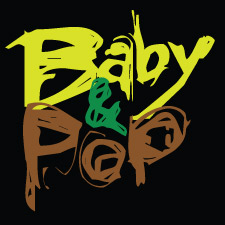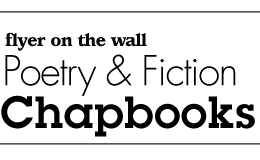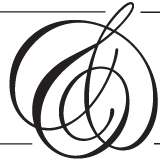
 |
Six |
Even before the floods came, Baby, I preferred to be alone.
When the floods came, all of the dimensions altered, and even respectable couples like me and Polly recommenced boozing and clubbing. All of the families on Joy Avenue let their kids roam around at night. We’d sit about in our twilight gardens, chatting, listening to the teenage neighbourhood tearaways (always a safe distance away, thank Christ) breaking windows, and talk about friends and relatives who, to our horror, had gone two days without a bath, or who’d lost a beloved pet rodent to the water.
That country wasn’t built for disasters, Baby. We weren’t used to death, except when it was held at a distance.
And some time, before I go, I’ll tell you the story of that night.
***
I have to turn my body to one side in case Baby can see me writing this. It’s been bothering me, but it’s true. Since he’s been here with me I’ve been able to hurt him.
I want to be alone. But I’m frightened of being alone.
The voice of Baby says,
We need to get away from this cave, Pop.
And all I can think is,
I need to get away from you, Baby.
This time, Baby, I say aloud into the emptiness, we’re going to get it right. We’ll bring down a smaller stone; one that can fit through the tunnel without any problems. We’ve made our mistakes and this time it’s going to work.
And then, to keep him happy,
And while we’re up there, we might as well go a little further out. Beyond the Elbow Pit, even.
Baby’s voice echoes back at me, loud, happy and obnoxious,
Really, Pop? Really?
Really. As soon as I’ve been down to the Moss Wall and got us the appropriate provisions. We’ll eat it here, this time, before we go.
My voice sounds out, cracked and nervous,
That’ll be nice, won’t it, Baby? A picnic here, in the Inner Circle, eating our moss together for once?
Baby replies, a little suspicious now, that, yes, he supposes it will be.
***
Baby doesn’t ask why I’m dripping again. He prefers to cultivate a resentful silence as we feel our way up towards the Rolling Pin. I don’t care. My stomach is satiated from the moss- not full, never quite full, even when the womb of my belly bloats out and bumps against the stone floor- and I stayed underwater till I counted to seven. Having a secret, knowing something Baby does not know, excites me, and we pass over familiar rock and landmark like giants bounding over an empty landscape.
As we move, something begins to creep out of the blackness and into my mind.
Baby, I ask, without stopping, have you ever seen anyone die?
And the answer comes back, through unfathomable distance,
No, Pop. That’s why I asked.
You weren’t...awake for all of that?
I don’t think so. I remember moments. It’s all rather like a dream.
That’s exactly how I feel. I think it but I don’t say it aloud. My hands find the place where the tunnel tightens and I remember the caught stone with a shiver. Then we’re on and squeezing through.
So when did you wake up, Baby? Exactly?
A moment of pure darkness.
Why is he hesitating? Is he lying to me?
I don’t remember, he says, not exactly. I remember flashes of light.
That was the power lines sparking off. They were falling towards the hill where we were standing and for a moment I thought they were coming for us.
That’s silly, Pop.
Well, I laugh, chafing my knee on something unexpected in the ground, everything else had turned against us. So it made a kind of sense.
I think, but don’t say,
That’s why it felt so just that the two of us should be wiped out as well.
We pass the unmoved stones. Their endurance is an accusation and I think back to the single rock, in the mouth of the tunnel, a useless monument to our efforts. Chilly water already creeping over it, up towards the Inner Circle.
Chasing us, I think, and my limbs shake beneath me. And then I stop.
We’ve reached the edge. You have to slide over the Elbow Pit, without falling. Once I was trapped in the Elbow Pit for three Sleeps. Only hunger drew me out. And we’ve been no farther.
Baby knows I’m nervous.
We’ll be all right, Pop, he says. I won’t talk.
We’re about to move into unfamiliar places, Baby.
I put him down, beside the edge, and lie flat, my chest pressing against the stone. My fingers reach for the other side.
I shuffle about, and bridge the gap with one leg. My foot finds solid rock on the far edge. I push, and for one moment I’m floating in total void.
Then my other foot scrabbles, and I remember to reach back just in time and snatch Baby over with me. We stumble to the ground.
Did we make it? Baby whispers.
Yes, Baby, we made it. We’re on the other side of the Elbow Pit.
My hands feel the new surface. This is a different kind of blackness; there’s nothing here I know or recognise. The ground is gritty, sloping upwards a couple of paces. I can reach out and touch one of the walls from my position but not the other one or the ceiling.
Ready, Baby?
His little voice comes back.
Think so.
I scoop him up in one hand and hold him aloft. This is all there is; three patches of rock beneath my knees and my hand, and Baby’s skin beneath the other hand. He must guess I’m frightened.
Onwards, he says.
***
The slow shuffle begins, lifting each knee carefully so as not to graze them, stretching ahead with the one hand, feeling like a torch. I have to focus. Smooth, angular stone passes beneath me. The tunnel must be moving downwards again.
I have to keep focused. Count the paces, for the route back. But I keep thinking;
If I didn’t have Baby, how much faster would I be able to move? Twice the speed, or more? My arm is beginning to ache with carrying him.
The passage is curving. Four hundred paces. The numbers no longer seem so clear. I clear my throat.
I keep thinking, Baby, what if I stretch out my hand and find something there? Wouldn’t that be frightening?
For a moment, nothing.
Baby!
I’m here, Pop. What do you mean, something?
I don’t know. Something that moves. Something that isn’t stone.
There’s nothing out here, Pop. You told me so yourself.
I know I did.
Four hundred and fifty paces. I reach out and my hand finds rock in a new dimension.
You’ve stopped, says Baby.
I’ve found a wall, Baby. Or...a pillar.
Curving, almost symmetrically, like a great stone pipe, I think, and I put Baby gently down and run both hands across it. Or a well into the depths below the Caves. What is this?
It can be explained. Anything can be explained. Stay calm.
My hands reach further around either side, until the edge of the rock is pressing against my chest, and the cylinder splits away in two directions.
It’s a junction, Baby. There’s two passages.
For the first time his certainty is shaken.
Perhaps one of them’s a dead end, he says.
You may be right. Stay here for a moment.
I feel ahead, trying not to shift too far forward, down the right-hand passage. It seems to move upwards- at least, for the next few paces. I shuffle back.
The right-hand one goes up, I announce.
Then we take that one, says Baby. I don’t have the heart to argue with him.
Let’s just sit here for a little while first.
***
Would you like me to sing to you? Baby asks, beneath my hand.
That’d be nice, Baby.
He must have been thinking this up in silence, because he can hardly stop giggling as he sings it, in an off-key chant which he presumably remembers as the tune.
My Baby don’t care for flowers
My Baby don’t care for money
My Baby don’t care for flowers
My Baby just cares for me.
He repeats it, three times, uncertain of the words.
Then only darkness.
Do you remember flowers, Baby?
Like moss, he says, defensively. Of course I remember them, Pop. My mother loved them. She liked to smell them. Then she’d make me smell them. I never understood it.
Smells. Do they still exist, in the Caves? Half-odours, I suppose, muted in the darkness. Damp moss, pressed to your face. Shit. Stagnant salt-water.
Time to move on, Baby says, gently.
No more moss, I murmur, as we go. Only dead stone. And something’s different in the air as well, don’t you think, Baby? Drier.
You’re imagining things, says Baby, from my hand. We shuffle on.
A thousand paces, I say aloud, and then, further into the blackness,
Two thousand.
***
Perhaps you could tell me a story, Pop, Baby says, after a while. My limbs are aching.
I really need to focus on the way ahead, Baby.
It might stop you from worrying, he says. He knows I’m starting to think about sleep. A rocky edge catches my hand and I dart it quickly to one side.
All right, then, Baby- what do you want to hear?
About the end, Pop. Tell me more about the end.
A few paces on, I tell him,
Near the beginning I found myself amongst a crowd of the other refugees, along the dual carriageway, raised on great concrete struts. Things weren’t so bad; cars were still roaring past us out of the city, loaded with people and possessions. You heard horror stories, afterwards, in the camps, mostly fabricated by those who seemed to thrill at the coming of chaos. Pedestrians halting cars and forcibly piling onboard, even attacking or killing the passengers.
I remember it more as the last holiday trip. We were still making jokes about the floods. Marie, who works in the same office as me, is chatting to an elderly couple who lived in the inner city, and who tell us, with a sort of gloomy pleasure,
It’s all gone. We don’t have anywhere to go.
They’re going to try and reach their son-in-law, who lives beyond the lower ground of the Thames, and ask him to come and pick them up. Kindly, they offer Marie a lift as well but she refuses.
Check the signal again, the old woman tells her husband at periodic intervals, and he pulls out an elderly mobile phone.
I’ve got nothing either, says an Australian man walking in front of us. Could be the masts are down.
But nobody has died yet, apart from a few pensioners on the news, and Marie and I talk briefly about what we’ll do if the floods come to the suburbs.
Did you like Marie, Pop?
I feel ahead. It’s dipping down again. I swing my legs gingerly over first, and then follow with the rest of my body.
Very much, Baby. She was good.
Baby seems to understand the flatness of the final word, because his next question is,
Were you and her having sex?
I was married to Polly, Baby. Remember?
He seems to squirm in my hand.
It’s the way you tell it, he mumbles. I’m never certain.
Can I finish the story?
Mm-hm.
I remember, because we pass beneath the old Nissan building, this great thing of glass, like diamond. And, dangling from the top, there’s an enormous poster of a smiling man and woman. Beautiful, naked, giants. They’re caught in each other’s arms, obscuring their nudity, but their faces are turned outwards, to us.
Why, Pop?
I suppose they wanted you to remember the product in connection with the man and woman.
And you have, Baby says, almost proudly.
Right. Well, anyway, it makes Marie smile, because they’re exactly the same while everything else around them has changed. And we walk on. And when we’ve gone a little way, we hear something funny in the air. Something very distant.
We turn, and watch. It just comes naturally to us to wait to see what happens next. And a few minutes pass, and some of the others are already trooping on.
Marie says,
The Barrier’s down.
And the old man says,
Nonsense, it’ll be sandbags.
We’ve counted seventeen black army helicopters in the sky today, delivering, the old man claims, sandbags to halt the advance of the sea.
But for a moment, Baby, though I won’t be there when it finally occurs, I can see it happen. A great wave, like darkness, spreading over the houses, bringing them down. And it comes to the Nissan skyscraper. Other cities built their towers to withstand nature, but we weren’t used to it. The thing shatters, tilting sideways, and the man and woman are still smiling, still locked, as the current drags them under.
Must’ve been frightening, says Baby.
I think, but don’t say;
No, not frightening. Who could say that they wouldn’t have felt a little satisfaction at watching that diamond tower topple into blackness?
You’d have become a traitor to your species, Baby, if you’d seen in your mind the glass implode; the whole monstrosity falling. You might even have cheered, or sung aloud.
Satisfaction at the thought that a power never before threatened on this earth is finally dropping from the peak.
The fortress, sunk.
I say,
I’ll tell you what happened, Baby, but I don’t want to tell you how I felt at the time.
Why?
There’s hope for you, Baby, and I don’t want to clutter your mind with thoughts of past things.
***
Are you hungry, Baby? I ask at last. Seven thousand, four hundred and ten paces. Two thousand of those in silence. The tunnel is coiling up, narrowing. I can feel the walls scraping my shoulders and arse as we move.
Doesn’t matter, he says, a little sulky. There isn’t any moss.
We’ll just have to find some.
There’s nothing up here, he says.
Eight thousand paces, I announce aloud. It’s almost cause for celebration.
How does that story end? Baby asks.
The skyscraper story? I should have thought that was obvious.
No, the one you told before. The king who turned into a cow.
Nebuchadnezzar?
Mm.
Well, he wandered the wilderness for- striking out wildly at any number- nine years, and then he became human again.
It’s not right, Pop.
I’m sorry?
I stretch out my hand against the narrow walls, feeling for moisture; any sign of low, vegetable life. There’s nothing.
First he was a human, then he was an animal. Next he should turn into something else.
Well, you can always come up with a new ending to the story, Baby. I don’t think anybody else is going to mind.
Pure blackness. He must be thinking about it seriously. The ceiling is getting too close; once it sifts along my hair and the top of my scalp.
Pop?
Mm?
What’re you going to do if you need to sleep?
It’ll be all right, Baby.
But you can’t sleep outside the Inner Circle.
My fingers find a crack in the rock. There must have been water here once, at least. A long time ago.
It’ll be all right, Baby.
A dead end. I feel about in all directions.
Not quite; my fingers touch nothing upwards. The passage must corkscrew up around on itself. The gap, eye-shaped, is just large enough to fit through.
I place Baby up on the ledge first, then rise to my full height. The roof of this upper passage is low enough to force me to stoop a little; the gap comes up to my chest.
We could always turn back, says Baby. I ignore him, and, scrabble up, with an undignified amount of squirming, grazing my thighs as I go. I feel ahead. Space. That’s something, at least.
Pop!
What?
Do you suppose the water’s still rising?
I imagine so.
I grasp at him with one hand and begin to wriggle forward.
Where do you think it’s got to?
Into the tunnels, surely, by now. At the sharp rock, maybe. But perhaps it’s rising faster now. Perhaps it’s reached Shitter’s Corner. Maybe it’ll drain away into the emptiness there and that’ll be an end to it.
I haven’t taken a shit in four Sleeps. Perhaps there’s something wrong with me.
What do you imagine caused it, Pop?
Once he starts to talk there’s no way of shutting him up.
I don’t know, Baby. Perhaps a crack in the rock burst suddenly. Perhaps something deeper, a long way away. There’s no way of being certain what it was.
Pop- Baby says, and my hand stretches forward and finds nothing.
For a moment we’re both in danger of going over. Then my other hand, still clutching at Baby, finds the wall and I stead myself. Baby’s head knocks against the stone.
Ow, he says, irritably.
We’ve come to a drop, I tell him. Hold on.
I put him down by my knees, and stretch out over the ledge, groping.
My fingers don’t touch any surface.
I feel about all around us. If there were any loose stones about I could toss one down to tell the distance of the drop. It could be fathomless. The ground could be barely out of reach.
It’s a risk.
But if we turn back now, how much precious time will we have lost?
Stay here, I tell Baby. I’m going to see how far down it goes.
I shuffle myself around so I’m facing backwards, and then edge along until my feet are touching into nothing.
My hands find the ledge. I let my body slip down, with a flash of pain in my arms as the weight yanks at them, and then I’m hanging on.
I count it,
One, two, three-
Coward. Once again.
One, two, three-
And I drop.
***
As if being thrown up by ghost-hands. Their fingers ruffling your hair.
***
I wait for the impact. Hard rock is pressing into my spine. Did I already touch the bottom? It can’t have been far.
I run my free hand along my ribs, my ugly, swollen stomach. How long has it been since I touched my own body, consciously, exploring the contours? My right leg. It bends beneath my hand, in entirely the wrong direction, before twisting out of reach. I can make out Baby’s voice, as if at great distance.
I need to sleep.




